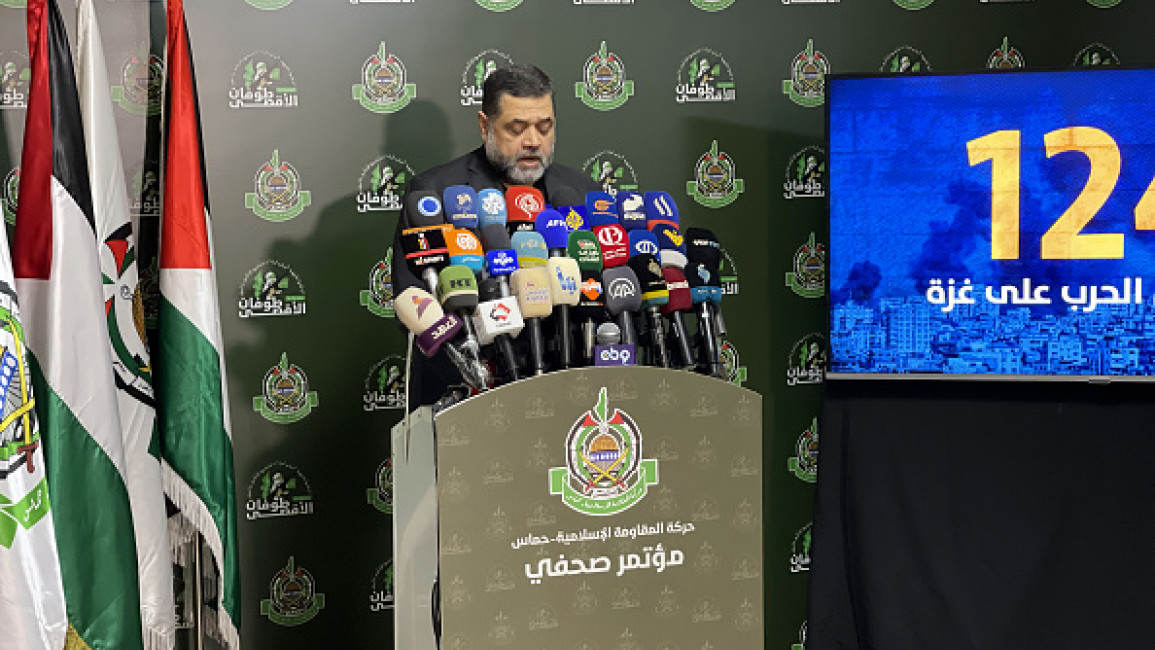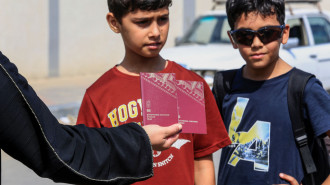Mediators push for partial ceasefire amid deadlock in Gaza talks: report
Attempts to reach a ceasefire and hostage deal in Gaza have led to pursuing alternative ways to halt hostilities- which includes potentially implementing a temporary pause.
This follows the two-day talks in the Egyptian capital over a Gaza deal which concluded without agreement on Sunday, where Hamas and Israel rejected several compromises proposed by mediators.
However, a new proposal has been reportedly suggested that sees a partial agreement on the initial phase of the ceasefire, with discussions on the remaining elements of a comprehensive deal to be pursued at a later stage, according to The New Arab's Arabic-language sister site Al-Araby Al-Jadeed.
In parallel, mediators are working to establish a humanitarian truce lasting between four to seven days to facilitate the distribution of polio vaccines and other essential aid.
This initiative follows calls from the World Health Organization (WHO) and UNICEF for a ceasefire of at least seven days to immunise approximately 640,000 children, in the wake of the spread of polio among children in the enclave.
Additionally, Al-Araby Al-Jadeed reports that the US administration is pressuring both Israel and Egypt to reopen the Rafah Border Crossing as soon as possible.
This could occur either as part of a ceasefire and hostage release agreement with Hamas or following a phased Israeli withdrawal from the Philadelphi Corridor along the Gaza-Egypt border.
The report does not clarify who would manage the Rafah crossing on the Palestinian side if an Israeli withdrawal takes place.
In addition, according to CNN on Monday, a senior US official said to be familiar with the Cairo talks indicated that mediators were discussing the "final details" of a potential agreement, including the names of prisoners to be exchanged as part of the deal.
Although this progress does not ensure that a final agreement will be reached immediately, negotiators in Cairo are currently focusing on the "nuts and bolts" of the proposed pact, the official added.
Another unnamed senior US official was quoted in an interview with news agency Reuters as having described the talks as "constructive".
The official added that they were conducted in a spirit on all sides to reach "a final and implementable agreement."
"The process will continue over the coming days through working groups to further address remaining issues and details," the official told Reuters, adding that the teams would remain in Cairo.
The senior US official also said there was continuous negotiation between the teams from Israel, the United States, and Egypt since Thursday, aimed at narrowing the remaining gaps.
White House national security spokesperson John Kirby confirmed on Monday that negotiations in Cairo to achieve a ceasefire in Gaza and a hostage deal are still pressing ahead.
Kirby added that the discussions will continue on the working group level for the next few days to iron out specific issues.
"The talks actually progressed to a point where they felt like the next logical step was to have working groups at lower levels to sit down to hammer out these finer details," Kirby said.
Brett McGurk, US President Joe Biden's top Middle East aide, will soon depart Cairo after extending his stay by one day to initiate the working-group discussions, according to Kirby.
Kirby also confirmed that one of the key issues for the working groups will be addressing the exchange of hostages held by Hamas and Palestinian prisoners held by Israel.
This comes after Hamas announced that its delegation left Cairo after meeting with Egyptian and Qatari mediators over the weekend in an attempt to halt, at least temporarily, Israel’s war on Gaza.
On Saturday, Qatar and Egypt said they met with senior Hamas representatives to review the proposal in detail.
On Sunday, Israeli officials reportedly joined the discussions to address unresolved issues, with the support of mediators.
Ongoing disagreements
However, two days of talks ended with Israel and Hamas still in disagreement over key issues, including the return of displaced Palestinians to Gaza and control of a strip on the Egypt-Gaza border that Israel captured in May and refuses to relinquish, according to UAE state-owned news outlet The National.
Additionally, there are unresolved differences between Israel and Hamas regarding the Palestinian detainees that Hamas seeks to exchange for the hostages it holds.
Sources told the publication that Israel has rejected the release of some high-profile Palestinian detainees and insists that others will only be freed into exile abroad, rather than returning to their hometowns in the occupied West Bank or Gaza Strip.
According to the sources, Hamas remains firm on its demands for a full Israeli withdrawal and a permanent ceasefire, both of which Israel rejects.
Israel maintains that it will not cease its military operations in Gaza until Hamas is eradicated and all hostages are released.
The talks have been based on a framework outlined by US President Joe Biden in late May, which he referred to as an Israeli proposal.
Regional tensions have intensified following the killing of two major leaders, Hamas's Ismail Haniyeh and Hezbollah’s Fuad Shukr, which seen threats from Iran and its allies about retaliation and led to increased diplomatic efforts to reach a ceasefire and avert a broader war.
However, following the end of the discussions on Sunday, Hamas official Izzat al-Rishq said in a statement that his group "reiterates its readiness to implement" the Biden plan.
The recent talks follow a major escalation in hostilities between Hezbollah and Israel, after exchanges of fire which did not end in significant damage in Israel.
Iran has also threatened to retaliate over the killing of Haniyah on Iranian soil last month.
Israel's military campaign has forced nearly all 2.3 million residents of the Palestinian enclave to flee their homes, leading to widespread hunger, disease, and the deaths of at least 40,000 people, according to Palestinian health authorities.




 Follow the Middle East's top stories in English at The New Arab on Google News
Follow the Middle East's top stories in English at The New Arab on Google News


![The US vetoed a UN Security Council (UNSC) resolution demanding a ceasefire in Gaza [Getty]](/sites/default/files/styles/image_330x185/public/2185152251.jpeg?h=7ef8ac04&itok=RpLSj2pu)